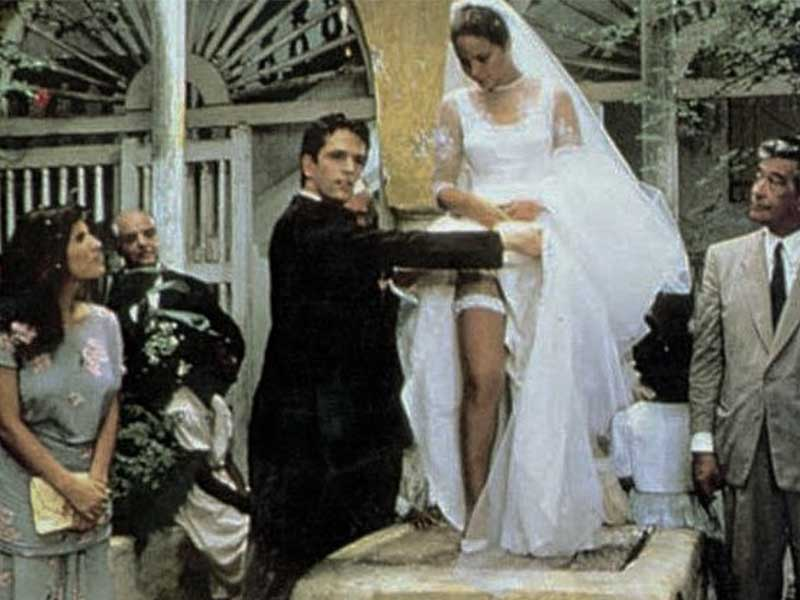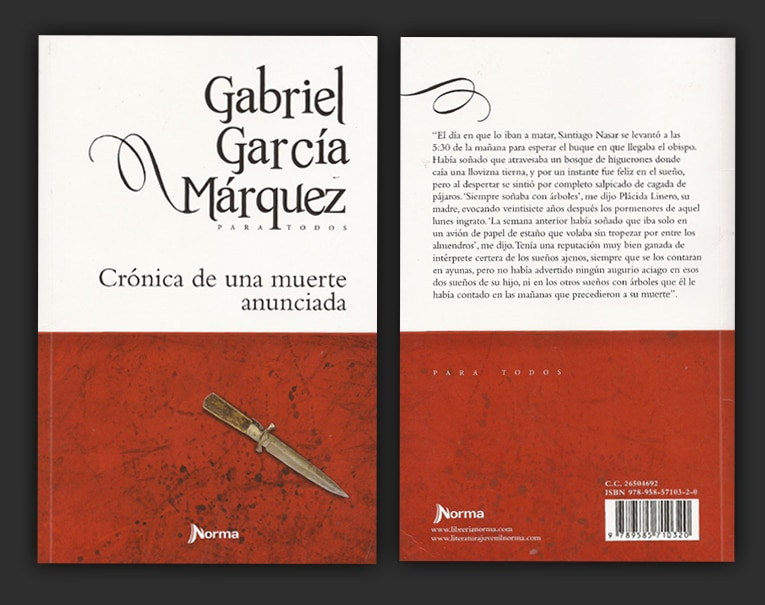
Today I would like to share with you a review that I have been meaning to write for a long time, but between so many obligations I always forgot. It is a classic of Latin American literature, written by one of the best authors on this side of the world, owner of nothing more and nothing less than a novel of literature. I am talking, of course, about Chronicles of a Death Foretold by Gabriel García Márquez, a book that we know very well because we are usually asked to analyze it in literature classes in high school. >Hoy me gustaría compartir con ustedes una reseña que hace mucho tiempo tenía pendiente, pero entre tantas obligaciones siempre se me olvidaba, se trata de un clásico de la literatura latinoamericana, escrita por uno de los mejores autores de este lado del mundo, poseedor de nada más y nada menos que un novel de literatura, estoy hablando desde luego de Crónicas de una Muerte Anunciada de Gabriel García Márquez, un libro que conocemos muy bien porque por lo general nos mandan a analizarlo en clases de literatura en la secundaria.

After their wedding night, Angela Vicario's husband discovers that his wife was not a virgin and, causing a huge scandal, returns her to her parents and goes out to kill Santiago Nasar for dishonoring the young woman. However, Angela's husband is not the only suspect in the crime, as her brothers, the twins Pedro and Pablo, also announced that they would kill Santiago, and in fact, he ends up stabbed in front of his own home. Years later, Santiago's friend, the narrator of the story, returns to try to solve the case.
Luego de la noche de bodas el marido de Ángela Vicario descubre que su esposa no era virgen y por lo tanto, armando un gran escándalo la devuelve a ella con sus padres, y sale directamente a asesinar a Santiago Nasar, por haber deshonrado a la joven, sin embargo, el esposo de Ángela no es el único sospechoso del crimen, pues los hermanos de ella, los gemelos Pedro y Pablo también anunciaron que matarían a Santiago, y en efecto él termina acuchillado frente a la puerta de su propio hogar. Años más tarde, el amigo de Santiago quien es el narrador de la historia, regresa para tratar de resolver el caso

This is the only work by García Márquez that I have read that does not contain his popular Magical Realism, the story does not have fantastic elements, on the contrary, it is a kind of questioning of the social norms of yesteryear, the concept of honor that they had years ago and the impact that this generated in society, of course, like almost all of García Márquez's works, this one keeps a lot of his own family history, for example it is said that his grandfather, General Márquez, came to murder a man in his youth for matters of honor.
Esta es la única obra de García Márquez de las que yo he leído que no contiene su popular Realismo Mágico, la historia no tiene elementos fantásticos, al contrario, es una especie de cuestionamiento a las normas sociales de antaño, al concepto de honor que tenían hace años y al impacto que esto generaba en la sociedad, eso sí, al igual que casi todas las obras de García Márquez, esta guarda mucho de la propia historia familiar, por ejemplo se dice que su abuelo, el general Márquez llegó a asesinar a un hombre en su juventud por cuestiones de honor.

Something that draws attention in this story is that, honoring its title, Santiago's death is completely announced, everyone knew it would happen at any moment but no one does anything about it because the community in which the events happen is completely passive and indifferent, which indicates a lack of collective responsibility, a total lack of empathy, it's as if everyone were saying "He asked for it" and in a certain way I also think that the author is making a criticism of the deficient judicial system.
Algo que llama la atención en esta historia es que, haciendo honor a su título, la muerte de Santiago es completamente anunciada, todos sabían que sucedería en cualquier momento pero nadie hace nada al respecto porque la comunidad en la que suceden los hechos es completamente pasiva e indiferente, lo que indica una falta de responsabilidad colectiva, una total falta de empatía, es como si todos dijesen "Él se lo buscó" y de cierta manera también creo que el autor hace una crítica al deficiente sistema judicial

And finally, what I would like to mention is that in this book there is no specific timeline, it does not follow a chronological sequence.
Y por último lo que me gustaría mencionar es que en este libro no hay una línea temporal específica, no sigue una secuencia cronológica.

Chronicles of a Death Foretold is a book that can be read in a short amount of time, not only because it's short, but also because of its fluid narrative and its interesting and dynamic story, in which the reader, in a sense, becomes a detective. I highly recommend it. Thank you for allowing me to share my opinion of this novel. See you another time, God willing.
Crónicas de una Muerte Anunciada es un libro que se lee en poco tiempo, no solo por tener pocas páginas, sino por su narrativa fluida y su historia interesante y dinámica en la que el lector de cierta manera se vuelve detective., así que la recomiendo mucho. Gracias por permitirme compartir mi opinión sobre esta novela, nos vemos en otra ocasión, Dios mediante.

(Imagen hecha con el editor de canva)
Image made with the Canva editor